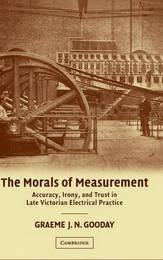
|
The Morals of Measurement: Accuracy, Irony, and Trust in Late Victorian Electrical Practice
Hardback
Main Details
| Title |
The Morals of Measurement: Accuracy, Irony, and Trust in Late Victorian Electrical Practice
|
| Authors and Contributors |
By (author) G. J. N. Gooday
|
| Physical Properties |
| Format:Hardback | | Pages:312 | | Dimensions(mm): Height 229,Width 152 |
|
| Category/Genre | World history - c 1750 to c 1900
History of science
Electricity, electromagnetism and magnetism |
|---|
| ISBN/Barcode |
9780521430982
|
| Classifications | Dewey:537.0287 |
|---|
| Audience | | Professional & Vocational | | Tertiary Education (US: College) | |
|---|
|
Publishing Details |
| Publisher |
Cambridge University Press
|
| Imprint |
Cambridge University Press
|
| Publication Date |
1 April 2004 |
| Publication Country |
United Kingdom
|
Description
The Morals of Measurement is a contribution to the social histories of quantification and electrical technology in nineteenth century Britain, Germany and France. It shows how the advent of commercial electrical lighting stimulated the industrialisation of electrical measurement from a skilled labour-intensive activity to a mechanised practice. Challenging traditional accounts that focus on the metrological standards used in measurement, this book shows the central importance of trust when measurement was undertaken in an increasingly complex division of labour. Alongside ambiguities about the very nature of measurement and the respective responsibilities of humans and technologies in generating error-free numbers, the book also addresses controversies over the changing identity of the measurer through the themes of body, gender and authorship. The reader will gain fresh insights into a period when measurement was widely treated as the definitive means of gaining knowledge of the world.
Reviews'... there is no doubt that The Morals of Measurement is a timely contribution to the history, as well as the historiography, of measurement.' Science 'Gooday's analysis offers a superb historical account of how technological developments within the electrical enterprise not only stimulated new techniques of measurement, but also raised crucial questions including what a measurement actually was, who counted as the measurer, and who would be trusted n the measuring process.' The Historical Journal
|